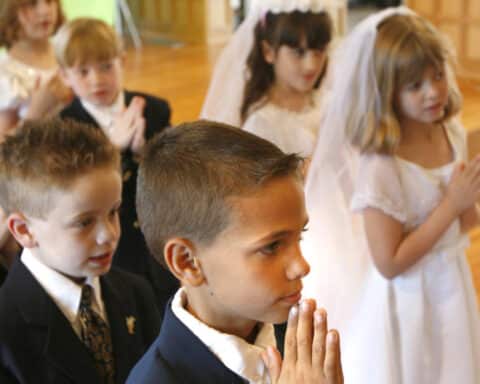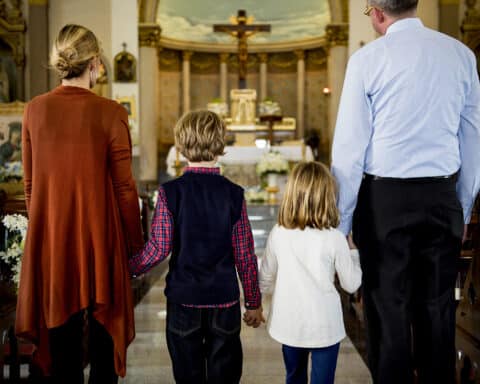This is the fifth installment of a 10-part series looking at the Ten Commandments.
The Ten Commandments were written on stone tablets so that, by observing them, human hearts might be rewritten. Our hearts are to be refashioned as we are freed, in Christ, for the love of God and the love of neighbor. This first tablet of the Law concerns the love of God as stated in the first three commandments:
-
- I am the Lord your God: you shall not have strange gods before me.
- You shall not take the name of the Lord your God in vain.
- Remember to keep holy the Lord’s Day.
Each of those commandments is about setting God apart, to perceive and respect holiness.
The first is about the holiness of God, who cannot be imagined to be like other things. The second is about the holiness of God’s name, which bears power that is completely unlike other names. And the third is about the holiness of the Lord’s Day, a day set apart from the others.
In turning our attention to the second tablet, we move toward the love of neighbor. But we’ve already seen in previous articles, especially the one regarding the Third Commandment, how the love of neighbor through mercy is already alive in the love of God. So we should be prepared, though we are moving on to the second tablet of the Law, to remember that the commandments build on each other.
Loving in order
There is an order to these 10 words of God, which, as Jesus says, are really two words of charity, but ultimately we see that even these two words are one word in the person of Jesus: the Word made flesh. He is the union of love of God and love of neighbor.
This will be especially true of the Fourth Commandment, which in one sense inaugurates the second tablet, but in another sense is the hinge between the first and second tablets. The Fourth Commandment is so simply stated — it says: Honor your father and your mother.
This one comes before the commandment about not murdering, before the one about adultery and before the ones about stealing and lying and coveting. In other words, it holds a pretty prominent place atop the second tablet.
But remember what we said about the First Commandment — it is not “first” just because it happened to be written before the others; it is first because the whole moral and spiritual life depend on it. Everything depends on receiving the word of God and honoring the Lord as God. Something comparable is true of the Fourth Commandment in relation to this second tablet, concerning the love of neighbor.
Here’s how the Catechism begins its introduction to this commandment:
“The fourth commandment opens the second tablet of the Decalogue. It shows us the order of charity. God has willed that, after him, we should honor our parents to whom we owe life and who have handed on to us the knowledge of God. We are obliged to honor and respect all those whom God, for our good, has vested with his authority” (No. 2197).
I want to point out three things from what is stated here in the Catechism. First, there is an order to charity — to loving our neighbor. This order, as we are told here, depends on the love of God and our worship of God, but in the pivot toward our love of others, it begins in the love for parents and those who care for us. In the order of charity, we do not abruptly switch from the vertical axis of love of God to the horizontal axis of love of neighbor. At the beginning of learning how to love neighbor, there is the vertical relationship and the vertical duty of loving our parents.
Second, this says that honor is due to our parents to whom we owe life and who have handed down to us the knowledge of God. If you think about it, that says something about what parenting is and what its duties are. Parents, first of all, give life and teach their children the love of God. Those of us who are parents should take note.
Third, we see here, once again, that it is part of God’s plan and God’s good order that we should have to depend on other human beings. Primarily, each of us depends on our parents for life. But this is a reminder that, far from despairing at the fact that we are not each independent, we should rejoice that we are created to rely on others and to have others rely on us.
Loving our parents, in reality
Let’s be honest: Honoring your father and mother really does need to be commanded! Parents do not need a command to love their children, but children — maybe especially when they’re full-grown — do need a command to love their parents.
Parents are a mystery: For all that a child may know about his parents, there is always much more he does not know. Or, sometimes, what he does know about his parents — all too well, in fact — makes loving his parents challenging.
| SIRACH 3:12-13, 16 |
|---|
| “My son, be steadfast in honoring your father; do not grieve him as long as he lives. Even if his mind fails, be considerate of him; do not revile him because you are in your prime. … Those who neglect their father are like blasphemers; those who provoke their mother are accursed by their Creator.” |
Think about it: Honor to parents changes over the course of a lifetime. What in the early years means obedience in the later years means caring for aging parents. What begins as instruction may grow, as children become adults, into mutuality. Those transitions in loving are often trying, and they require you (the child) to change.
But if we think about how the relationship with parents changes over the course of a lifetime, we can see how the stable disposition to honor parents will teach someone how to honor others. As a child, you learn to obey your parents, but as an adult you must obey legitimate authority. As an adult, you learn how to reason and deliberate with your parents, as you also must do with other adults in social life. And when your parents are aged and in need of care, you as the grown child learn how to care for others and suffer for them, as you would do when you become a parent, or a teacher or you perform works of mercy.
The stable disposition to honor your father and mother is a lifelong education in love.
To put it bluntly: You do not choose whether or not to do it, when and where not to do it, or even the terms for doing. You just do it. You honor them. And sometimes it is really hard.
Love and honor
The Fourth Commandment reminds and challenges us of the primary responsibility to love and honor those closest to us, because if we do not love them well, we are not likely to love anyone well. But if we do honor our parents, we become people capable of seeing everything else aright, with our hearts tuned to charity.
Father and mother are set apart in the Fourth Commandment not because they are holy, but because God is holy. The commandment to honor your parents follows the order of God’s personal address to us, which forms us in having our hearts rewritten for charity. It is not a matter of calculating who’s worthy of honor and who’s not; it is instead a matter of erring on the side of honoring.
God, in his wisdom, knows that we will learn to see the beauty in those we love through the hard work of loving them. We will not often begin by seeing the beauty — we’ll end there. And so we are each commanded — for our own good and the good of society in view of the kingdom of God — to honor your father and your mother.
Leonard J. DeLorenzo, Ph.D., works in the McGrath Institute for Church Life and teaches theology at the University of Notre Dame. His new book is “A God Who Questions” (OSV, $12.95).





